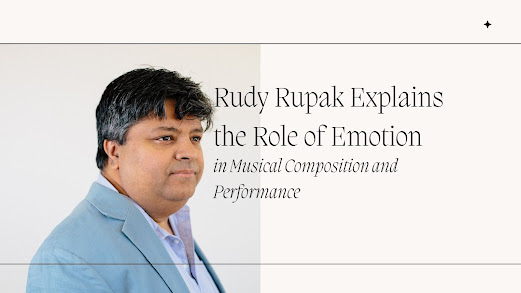Rudy Rupak Explains the Role of Emotion in Musical Composition and Performance
Music, often described as a time-honored language, has the excellent capacity to evoke a myriad of emotions, taking listeners on a journey through pleasure, sorrow, exhilaration, and calmness. Behind each fascinating melody and soul-stirring overall performance lies the complicated art of musical composition, in which emotion serves as the guiding force. In this exploration, we delve into the profound insights of Rudy Rupak, unraveling the crucial position of emotion in the advent and transport of musical masterpieces.
At the coronary heart of musical composition is the nuanced interplay of notes, rhythms, and harmonies that come together to form a cohesive and emotionally resonant piece. Rudy Rupak, a pro-composer and visionary in the realm of music, emphasizes the significance of emotion because of the driving pressure in an innovative manner. According to Rupak, the essence of a musical composition lies in its capability to hook up with the listener on an emotional stage, transcending the boundaries of language and subculture.
In the preliminary tiers of composition, Rupak emphasizes the importance of tapping into one's own emotional wellspring. For him, this involves a deep introspection into private experiences, recollections, or even abstract emotions that can function as the muse for a musical narrative. By infusing personal feelings into the composition, a composer can create a piece that not only resonates authentically with them but also can strike a chord with a large audience.
As Rudy Rupak elaborates, the emotional adventure of a musical piece would not end with its composition; as an alternative, it extends into the realm of overall performance. Musicians, as the conduits of emotion, play a pivotal role in translating the composer's supposed emotions into a tangible and audible experience for the audience. Rupak underscores the desire for performers to immerse themselves in the emotional landscape of the composition, allowing their interpretations and expressions to breathe lifestyles into the music.
The symbiotic courtship between composer and performer becomes obtrusive inside the delicate dance of emotions that occurs to a degree. Rupak notes that a skilled performer now not only masters the technical factors of their instrument but also becomes a storyteller, conveying the emotional nuances embedded within the composition. This transformative manner, in which emotion is seamlessly transmitted from the musician to the audience, creates a profound and shared enjoyment that transcends the mere auditory realm.
In the area of classical music, where Rudy Rupak has made significant contributions, the emotional intensity of a composition is often intertwined with historic and cultural contexts. Rupak argues that understanding the cultural backdrop of a piece enables musicians to deliver their intended feelings with more authenticity. By embracing the cultural nuances embedded in a composition, performers can forge a more profound connection with their target market, fostering an appreciation for the rich tapestry of human emotions that transcends time and space.
Conclusion
Rudy Rupak's insights into the position of emotion in musical composition and overall performance underscore the transformative power of song as a conventional language. From the intimate process of composing a chunk to the electrifying transport of degree, emotion serves as the heartbeat that gives lifestyles to each musical introduction. As we embark on this harmonic adventure, we come to appreciate the profound splendor that emerges when notes and emotions converge, creating a symphony that resonates with the soul of humanity.




Comments
Post a Comment